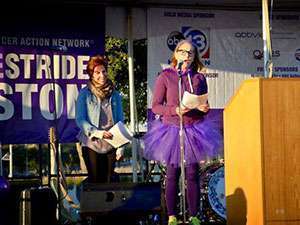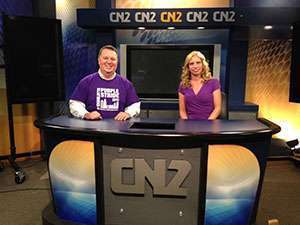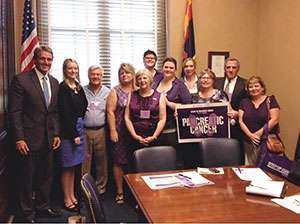
Mary Sharkey, 14-year survivor and a Survivor and Caregiver Network volunteer, speaks about the importance of pancreatic cancer fundraising at PurpleStride Houston.
From sharing their experience with patients and families, to organizing PurpleStride® and PurpleLight events, to advocating on Capitol Hill, volunteers serve as the life force of the Pancreatic Cancer Action Network. Thousands of volunteers put their spirit of hope into action year-round to support those coping with the disease and to raise awareness of it.
“Our legions of volunteers Wage Hope against pancreatic cancer every day,” said Julie Fleshman, President and CEO, Pancreatic Cancer Action Network. “They do so because they are driven by the fierce passion that comes from having somehow faced the most deadly form of cancer.”
Fourteen-year survivor Mary Sharkey decided to use her own experience with pancreatic cancer to help others battling the disease. When her pancreatic cancer went into remission, she followed her husband’s recommendation and called PanCAN Patient Services to find out what she could do. “After the wonderful people at the call center helped me, I saw it as my responsibility to be there for others who were going through what I did,” said Sharkey.
A volunteer with the Survivor and Caregiver Network since 2002, Sharkey has been meeting with patients and their family members in person, on the phone and via email to share her story, discuss the latest medical news or simply to listen and comfort. “When those struggling with pancreatic cancer look into my eyes and hear that I’ve been a survivor for 14 years, it fills them with hope and helps them better cope with their journey.”
Shared experiences can also help caregivers with the healing process after losing a loved one. Over the course of a year, Shannon Gardner’s mother was in and out of hospitals with pancreatitis. Only eight days after she was diagnosed with pancreatic cancer, Gardner’s mother passed away. A friend from church invited Gardner to a PurpleStride event, where she ran the 5K for her mom. Then later, she attended Advocacy Day for herself. “Going to our nation’s capital for this event changed my life. Meeting volunteers, researchers, legislators and especially survivors from around the country gave me the heartwarming gift of fellowship.”

Mark Weber (Charlotte Media Chair) interviews Shannon Gardner (Charlotte Volunteer Chair) on CN2 News in Rock Hill, S.C. about her mom’s cancer journey and volunteering for PurpleStride.
Gardner knew she wanted to do something for others with the knowledge, healing and inspiration she gained from Advocacy Day, which led her to become the first Volunteer Chair of the Charlotte Affiliate. Engaging new volunteers, organizing committee activities and sharing her journey with new caregivers and patients motivate her to try to help families feel less isolated and helpless. Gardner added, “When I meet survivors today, I can’t help but think about where their journey will go and how I might be able to support them along the way.”
Martin attributes that self-confidence to volunteering with the affiliate by mobilizing local advocates, organizing events, and speaking with supporters who know nothing about the cause. “I’ve learned a lot about myself and my capabilities. Part of the reason why is that everything we do as volunteers for this cause feels so necessary and vital. I know my time and skills are being utilized in such a critical way. There’s no internal conflict about whether or not this matters. I can see firsthand that it does.”
Making a worthwhile difference as a volunteer for the pancreatic cancer community can sometimes come down to just one person. Martin shared a story about the first PurpleStride event she helped organize, when a man who had just been diagnosed came to the event for the first time as well. He was on his own and didn’t know anyone. Martin said, “We asked him to join other survivors on stage, and it was as if he became a celebrity that day. So many people spoke with him and connected with him. He left really happy.”

Phoenix Advocacy Chair Megan Martin (first row, third from right) with Arizona Senator Jeff Flake (far left) and fellow affiliate members at Advocacy Day in Washington, D.C.
Connecting with fellow volunteers, survivors and caregivers, as well as forming a community of support, is what motivates many to continue and to grow with the organization for years. Sharkey said, “The strength of our united voice spurs more funding, more research, more clinical trials and more awareness, which ultimately leads to more survivors.”
Every person’s experience with pancreatic cancer can be meaningful, and as Gardner realized, “Your pancreatic cancer story becomes an asset that can benefit not only others but also you when you share it.”
It is extraordinary what can happen when one individual extends a hand to help others hit by this disease. After Pamela Acosta Marquardt lost her mother to pancreatic cancer in 1996, she went on to found the Pancreatic Cancer Action Network. When Julie Fleshman’s father passed away from the disease in 1999, she first joined the organization as a volunteer and today serves as President and CEO.
“Without our volunteers, we wouldn’t have been able to accomplish what we’ve done in such a relatively short period of time,” Fleshman said. “They can see directly how their efforts are making a tremendous impact in their local communities and on the national level, with real-world results such as the Recalcitrant Cancer Research Act.”
Fleshman continued, “Changing the course of pancreatic cancer, which is so overlooked and underfunded, has demanded the passionate and proactive attitude of our 90 volunteer communities across the country. Our volunteers move mountains every month, and we are so appreciative for the miraculous things they do and the remarkable people they are.”
We thank all of our passionate volunteers. Are you involved? If not, step up and volunteer with us today!





